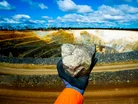Why Nickel Price Slump has hit BHP so Hard

Australian mining giant BHP is to suspend its domestic nickel operations, following the global oversupply of the metal that is vital for the manufacture of electric vehicle (EV) batteries.
BHP President Australia Geraldine Slattery said the move was “difficult but necessary”, given the global surplus is expected to last for at least three years and that “efforts to find a “viable path forward” had been exhausted”.
BHP's nickel business employs around 3,000 people, including 1,600 front-line staff. The company said the “temporary suspension” will be reviewed in February 2027.
The transition period starts this month, with the first stages of the suspension to start in October and the process to be completed in December.
The suspension includes mining and processing operations at its Kwinana nickel refinery, its Kalgoorlie smelter and its Mt. Keith and Leinster mines. It will also halt development of its West Musgrave project, which includes nickel deposits.
What has caused global crash in nickel prices?
In 2022, the supply of nickel – a key metallic input for electric vehicle (EV) batteries – exceeded demand by 112,000 tonnes, the largest surplus since 2014. These figures were provided by the International Nickel Study Group (INSG), a UN-related intergovernmental organisation.
The cause of the nickel price crash is Indonesia, where the government is set on turning the country into a major hub for battery metals.
Indonesia's mined nickel production expanded by 48% to 1.58 million tonnes in 2022, according to the INSG. The country now accounts for about half of global output.
The nickel mining boom is also feeding a nickel processing boom, with the production of nickel pig iron growing by 32%, and output of intermediate nickel products nearly tripling to 288,000 tonnes in 2022.
Why nickel price slump has hit Australia hard
Again, it is because of the rise of Indonesia as a major global player in the nickel industry. Australia’s influence as a producer of nickel has diminished with the emergence of Indonesia as a dominant force in the nickel market.
Indonesia blindsided Australia to become the world's top refined nickel producer, after it spent a decade banning raw nickel exports in a bid to make itself a major producer of processed nickel. This saw it move up the supply chain and vastly increased the value of its nickel exports.
The Indonesian nickel industry has been backed heavily by Chinese investment, who need huge supplies to sustain its colossal EV manufacturing sector. In February 2024 Nickel prices bombed, following a global supply glut from Indonesia engineered by China. The global price fell from a high of US$50,000 in 2022 to just $16,400 per tonne.
In response, BHP wrote down the value of its West Australian nickel division, Nickel West, to zero. It was at that time that it first said was considering placing the entire division into a “period of care and maintenance”.
“Like others in the Australian nickel sector, we haven't been able to overcome the substantial economic challenges driven by a global oversupply of nickel,” BHP’s Slattery added.
BHP said it will “support our workforce and communities” and that it would invest about $300 million each year after the transition period to support a potential restart of the operations when the market improves.
Slattery said the company is "optimistic" about the outlook for nickel after the end of the decade, based on the rollout of electric vehicles.
"Now, of course there's uncertainty with that, but we've got sufficient conviction to maintain investment in the option of bringing the Nickel West business back into operation," she said.
